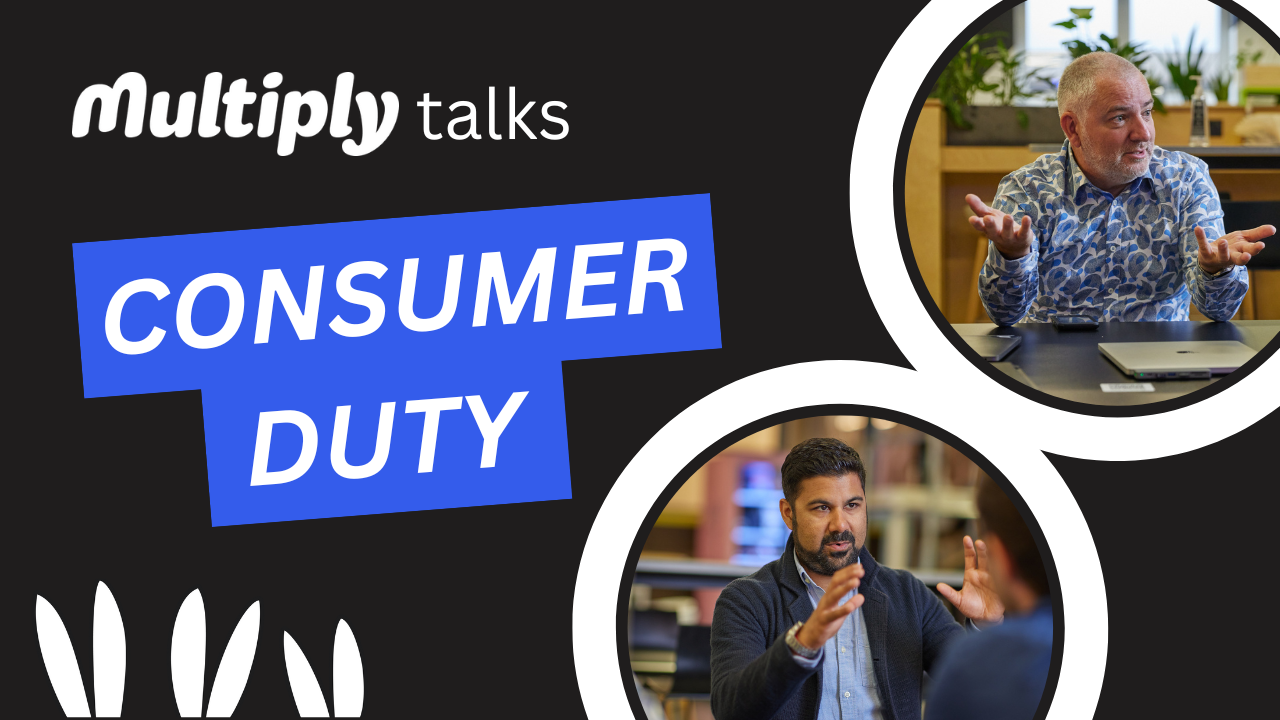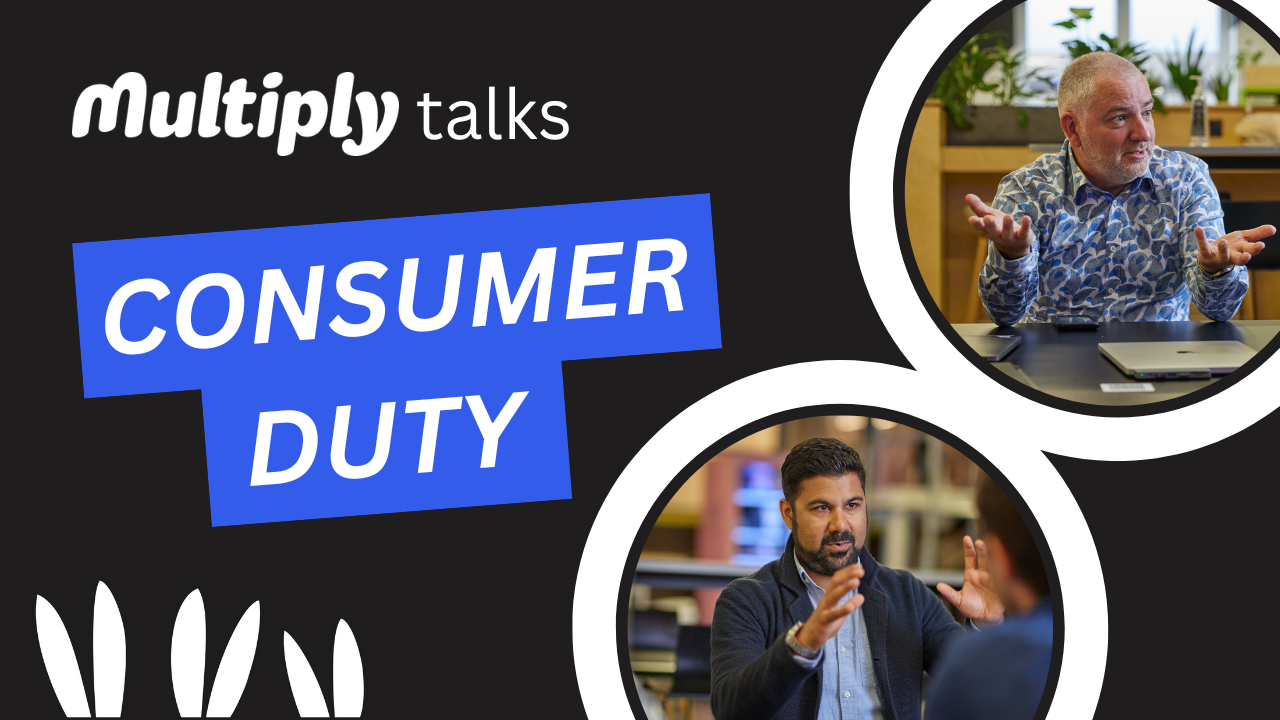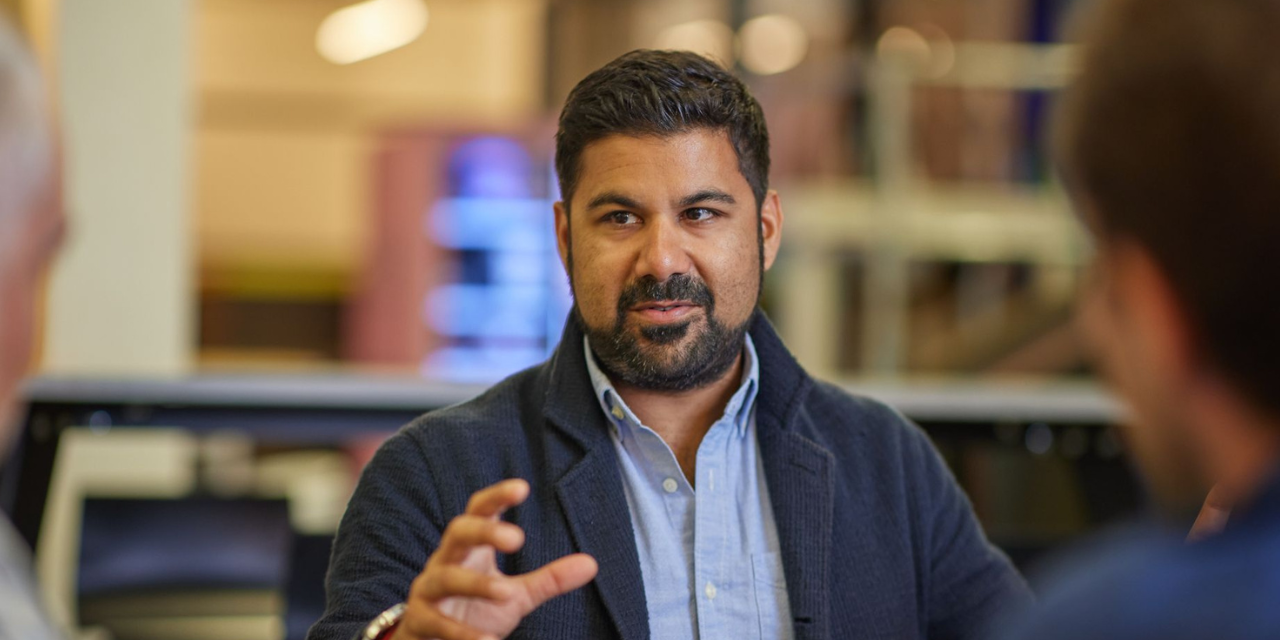Multiply Talks: Consumer Duty

How Technology Can Help Financial Institutions Meet The FCA's Consumer Duty Requirements
Join Multiply's CEO, Vivek Madlani, and Head of Advice, Peter Fairweather, in this insightful discussion on the impact of Consumer Duty on the financial services industry. Discover what this means for consumers and gain expert knowledge on how the industry can better serve and protect their interests. Explore how technology can help financial institutions comply with the FCA's Consumer Duty requirements while delivering exceptional consumer education and protection. Don't miss out on this informative discussion!
Transcript
Peter Fairweather: How can technology help an adviser firm meet its Consumer Duties?
And, for me, there are three core areas in fact, there are lots of areas where technology can improve across multiple different areas.
But there are three core areas that I think technology definitely stands out. And the first of those is about changes to the way that the advice is actually delivered in its own right, in other words, the core service offering.
And that could either be through adding service offerings, or by changing the way the existing service offering is being done.
The second one I think is very much about the use of data. And I find it really interesting that adviser firms, in their back office systems have held lots of management information for many, many years but technology's never really been used to give the insights into what the firm's target market is and going beyond that into an improved use of data for marketing purposes, for example. And those two, I think are the two key ones.
The third one, I guess is a little bit ancillary, but the use of technology if it's used fully and across all of service offerings, allows a firm to have much better control over the content that it uses in the advice journey, and whether that be used simplicity of consistent way of asking the same question in a fact find or whether that be, and probably more importantly here about the core template that goes around a suitability letter being consistent, and that's not, obviously forgetting the fact that advice is bespoke and it should be personalised to the individual. So we're not saying to suddenly put a template in that's just the same for all and that's clearly not what the regulator's looking for, but it does deliver a way of consistency in its content of the process and the outputs of that journey.
Vivek Madlani: I broadly agree with those three different areas. I think that last point is something that we, I guess, experience firsthand and talks to this Consumer Duty point around the quality of product and services.
We found that through, digitising aspects of the journey, such as the fact find, or even the presentation of the recommendations themselves, it would bring a lot of that consistency that we could derive comfort from into the recommendations we were generating, and would actually end up helping on the risk management side, on the quality control side.
And I think that's something that is probably underappreciated across the industry. But I think it's something that will be a kind of penny drops moment. When firms start automating more and more of the advice generation side of things.
On the core product proposition itself. Yeah, I think we should probably dig into that a little bit deeper because that's probably where we have slightly different perspectives. But my viewpoint on this is, through providing digital propositions where you automate some or all of the core advice journey, a firm would be able to provide advice at a far lower price point than if it was all done via humans and human advisers, and a totally face-to-face process. And that talks to one of the core points of Consumer Duty, which is around the price and value of products and services.
So I think it can have a material impact on the price of the service of advice itself. I guess my nuance viewpoint around this is that there's a whole spectrum when it comes to, I mean, you can call it advice, guidance, information, whatever, but you know, we can term all of it in the arena of helping people with their finances.
And there's a whole spectrum of that, which I think can be dealt with through digital propositions very well. Digital propositions are well-positioned to fill that gap. Whilst, I think there are definitely areas of that spectrum where due to its complexity or risk or whatever it may be, they are better served via human advisers and the kind of more traditional face-to-face service.
Peter Fairweather: Yeah. I think we are on the same page looking at it through different lenses slightly. I guess that comes from my background being an adviser for so many years.
Is the adviser space ready for full automation through the process? I'm not so sure there'll be a mixture, there'll be some that are fully on board with it, looking to automate absolutely as much as possible of the process. There'll be the other extreme, and I'd like to think this is a diminishing part of the industry where they're still thinking that maybe technology still doesn't have a part to play and it's all about face-to-face, with the customer.
I think the vast majority now are in the space of where we would use the word hybrid. Hybrid in this sense being a mixture of technology to try and be more efficient and profitable in certain areas of the process. But putting the human adviser in the parts of the process where the real value from a customer is seen to be had.
Now, this is where I think it's interesting because if you break down the broad process of the fact-finding process, the analysis stage, the creation of the actual guidance or advice, depending upon the proposition, the presentation of that guidance or advice, implementing the advice, then you've got the ongoing services that will sit alongside that.
When you look at those in individual steps, this is where technology I think really has the power to change things. There are people where the fact-finding process is seen as a, "well we know we've got to do this", but it takes up so much of the adviser's time going through that process, that that's an area where automation should be improving that process.
Similarly, and this one's a new one, I think, for advisers, where the analysis of that data and the creation of the solution has typically been one of those things that's in the adviser's head. Now the challenge that we went through over the years, is actually taking what's in the adviser's head and creating the algorithms and the AI that goes alongside that to actually create the solutions automatically, that's not necessarily to present it to the customer. You know, this all comes down to where the adviser sees their value being. But if more and more of that analysis and creation of the solutions can be presented to the adviser automatically, now we are really starting to get to a point where we can cut costs, value for money improves and costs can come down.
The interesting part for me in this is this is where the advice gap is. One of the areas that advisers very much focus on are people who have got maybe more complex needs. And at the moment, I'm not convinced that automation, or should we say the industry, is ready for automation in all of these areas.
I'm not sure the customers are necessarily in the more complex areas ready for it, but. I do think that the core areas that are falling through the cracks in terms of advice gap, this is employees, workplace pensions, this type of advice. This is classic territory for automation. And this is where I think that costs can come down, not necessarily changes in the service that's being offered by advisers, but it may be in some cases, but the addition of services that they can offer. So an adviser firm can go to a corporate company and offer an automated solution that may be via their intranet. It may be via the adviser's service, that that's sort of technical detail that they don't need to worry about at the moment. But there's an opportunity here to provide services efficiently, cost-effectively, and that will bring the value for money that is ultimately what the FCA is looking at adviser firms to look at.
I think it is also worth noting that many adviser firms that I've been talking to feel that they're 95% of the way there with Consumer Duty because they're an adviser.
They think that because they're an advisor, that in their own right means that they're doing the right things for their customer.
And it's very clear as we've been talking here, value for money and delving into that, I think is where adviser firms really need to be focusing their efforts with their propositions.
Because if they use technology efficiently into their processes, I'm convinced nearly every adviser firm would be implementing technology. Because when you sit there and think, why wouldn't I, why wouldn't I be more efficient?
Vivek Madlani: I think you're spot on there. And I think post-RDR, there was so much work that had been done around consumer understanding, consumer support, even the price and value of products and services and quality to a degree.
So you're right, there is a sense across the industry that a lot of the work has already been there via years and years of effort putting in new systems and processes into the way they operate.
Data is something that over the last six years or so, we've used a lot of, and, in almost every way conceivable, to be honest. You mentioned marketing. We've used it for customer insights, on the product side, understanding customer segments. Obviously, data is central to the way we generate the recommendations that underpin our service in the first place.
But it'd be good to get your viewpoints on how it could specifically help when it comes to Consumer Duty.
Peter Fairweather: Well, first of all, I think it's worth noting that most people in Multiply know that Peter Fairweather the head of advice is, in a tech company, not the most tech savvy.
So when it came to the word "insights" being presented to me, the first thing I actually did was a Google search on, well, what does insights mean? And I apologise in advance if I get this technically incorrect, but it's the way my head processes it. And what I read was very much that you've got data and data being very much the raw facts.
Management information is the bit that sort of collates this in various different ways to paint a picture to the advisor. What I hadn't grasped was insights is actually very similar to what the adviser does with their customers. When I was seeing customers, one of the bits that really is important to me was if I was talking to somebody about one of the key features of a product.
Yeah, okay. It might have a 25% protection level on an annuity. Okay, that's the key feature. But what does that mean to you?
That was always what my job was about, was taking these bits of often technical points and relaying them to the customer in what that means to them. Now, insights I see as being very similar in the data world, and so you can get bits of management information and it tells you something, but what does that mean to you or your firm?
And a classic example of that might very simply be that doing an email marketing campaign and client group A is opening your email at, let's say a rate of 10% and client group B is opening at a rate of 20%. Well, the insight there, it sounds very obvious, but often what it means to you is relatively simple.
The insight concludes that you should be tweaking your strategy to be able to adopt more of client segment B, for example, with that email and maybe trying different emails and content with client segment A. and that's just an example. So to me, it's very much about insights being the key difference that today's technology can deliver.
And yesterday's technology was very, very good at collecting data if the adviser put it into their system and presenting management information.
But insights is the key. And why is this all important? Because Consumer Duty is expecting you to understand your target market, delivering services that are appropriate to that market.
And that's where I see insights as being so critical in this process.
Vivek Madlani: From my point of view, I think this will be, One of the key things that will differentiate the advice firms that really succeed from the ones that don't, in the coming years.
In a very similar way to what's happened in e-commerce and retail and, and other industries as well.
Peter Fairweather: And if you've got that technology layer in there to be able to have dashboards that are presenting core insights into your business, whether it be your existing client bank or the customers that you are trying to approach, it puts a tick in the box.
Let's just say Consumer Duty is not about just putting a tick in the box, but it puts a tick in the box on the way you are going about your Consumer Duty obligations. You are putting in place technology that gives you insights. Obviously, the real stuff is about what you then do with those insights.
Vivek Madlani: That's certainly part of the suite of what we offer here at Multiply.
Peter Fairweather: I do think that having gone through the build of Multiply over the years, it has been interesting to me to see how advisers too often, I put my hands up to this one, advisers too often use jargon and it's innocently done as well because I'm sitting there thinking, well, I understand what marginal rate of tax is.
But then actually you have somebody turn around to you and say, what do you mean by marginal rate of tax? And there's those bits where if you can put the question you are trying to ask into plain English and then use technology to be able to deliver that consistently in the way that you do your fact-finding process, for example, or the way you present your recommendations I think it puts a big tick in that plain English box for me where it's too easy as an adviser to revert to type and then go back to accidentally talking about marginal rate of tax, for example, where technology puts it in a system that allows you to always use good language.
But the more you talk good language, the more it just becomes ingrained in the way you would present anyway.
Multiply Talks is perfect for anyone interested in the intersection of technology and finance. Whether you're a financial services professional, a technology enthusiast, or just someone curious about the latest trends and innovations, Multiply Talks has something for you. Subscribe now to stay up-to-date on the latest in tech and finance!



